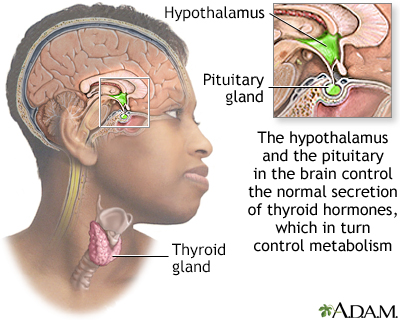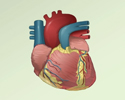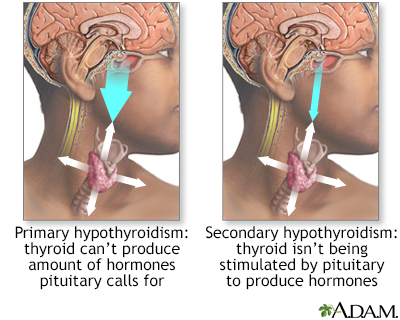Hypothyroidism
Hypothyroidism is a condition in which the thyroid gland does not make enough thyroid hormone. This condition is often called underactive thyroid.
Hypothyroidism - Animation
Do you feel tired and weak? Well, there could be many reasons for that, but a slow, underactive thyroid may be your problem. Let's talk about hypothyroidism - also known as Slow Thyroid. Here's the thyroid. It's this butterfly shaped gland in your neck - just below the voice box. The thyroid gland is known as the master gland of the body. It regulates our metabolism, so we don't act slow, like turtles, or fast, like jackrabbits. This gland releases hormones that control many important things, like helping your heart pump blood, stimulating your brain and muscles, and helping you keep your body at a healthy temperature. When you have hypothyroidism, your thyroid gland does not make enough hormone, so you end up feeling a bit slow, and perhaps cold, like the turtle. So, what causes a slow thyroid? For at least 9 out of 10 folks, the cause is something called Hashimoto's thyroiditis -- It's what we call an autoimmune condition, where, for reasons that we don't quite understand, our own body attacks perfectly good thyroid tissue as though it were a foreign invader. This attack damages the thyroid gland, so much, that it can't put out enough hormone. This attack happens much more often in women than in men, 10 and 20 times more often. Also, some women develop this condition soon after pregnancy, Why that happens? Nobody knows for sure! So, how do you feel if you have a slow thyroid? If it's just mildly slow, you might not feel anything at all, that's called subclinical hypothyroidism. On the other hand, you might be experiencing symptoms of a slow thyroid RIGHT NOW, but you just haven't connected the dots. You might have mild fatigue, memory or concentration problems. You may have a decreased sex drive, or have trouble losing weight. If you have hypothyroidism, the main treatment is to use a synthetic form of T4 hormone, called Levothyroxine, that simply replaces what your body isn't producing. After starting hormone replacement, your hormone levels should be checked about every 6 weeks, to make sure you are maintaining normal levels. It's important to remember that treating hypothyroidism does not cure the problem, it only controls it. And once you're on Thyroid hormone replacement, you're probably on it for life. The good news is that once your thyroid situation is properly regulated, you'll probably feel a whole lot better.
Causes
The thyroid gland is an important organ of the endocrine system. It is located at the front of the neck, just above where your collarbones meet. The thyroid makes hormones that control the way every cell in the body uses energy. This process is called metabolism.
Endocrine system
Endocrine glands release (secrete) hormones into the bloodstream. The endocrine glands include:AdrenalHypothalamusIslets of Langerhans in the pancrea...

Metabolism
Metabolism refers to all the physical and chemical processes in the body that convert or use energy, such as:BreathingCirculating bloodControlling bo...


Brain-thyroid link
Although the thyroid gland releases the hormones which govern growth and metabolism, the brain (the pituitary and the hypothalamus) manages the release and the balance of the amount of hormones circulated.
Hypothyroidism is more common in women and people over age 50.
The most common cause of hypothyroidism is thyroiditis. In people with thyroiditis, swelling and inflammation (usually low grade) damage the thyroid gland's cells.
Causes of this problem include:
- The immune system attacking the thyroid gland
- Viral infections (common cold) or other respiratory infections
- Pregnancy (often called postpartum thyroiditis)
Other causes of hypothyroidism include:
- Certain medicines, such as lithium and amiodarone, and some types of chemotherapy
Chemotherapy
The term chemotherapy is used to describe cancer-killing drugs. Chemotherapy may be used to:Cure the cancerShrink the cancerPrevent the cancer from ...
 ImageRead Article Now Book Mark Article
ImageRead Article Now Book Mark Article - Congenital (birth) defects
- Radiation treatments to the neck or brain to treat different cancers
Radiation treatments
Radiation therapy uses high-powered radiation (such as x-rays or gamma rays), particles, or radioactive seeds to kill cancer cells.
 ImageRead Article Now Book Mark Article
ImageRead Article Now Book Mark Article - Radioactive iodine used to treat an overactive thyroid gland
- Surgical removal of part or all of the thyroid gland
- Sheehan syndrome, a condition that may occur in a woman who bleeds severely during pregnancy or childbirth and causes the destruction of the pituitary gland (which regulates the thyroid gland)
Sheehan syndrome
Sheehan syndrome is a condition that can occur in a woman who bleeds severely during childbirth. Sheehan syndrome is a type of hypopituitarism....
 ImageRead Article Now Book Mark Article
ImageRead Article Now Book Mark Article - Pituitary tumor or pituitary surgery
Pituitary tumor
A pituitary tumor is an abnormal growth in the pituitary gland. The pituitary is a small gland at the base of the brain. It regulates the body's ba...
 ImageRead Article Now Book Mark Article
ImageRead Article Now Book Mark Article

Hypothyroidism
Hypothyroidism is a decreased activity of the thyroid gland which may affect all body functions. The rate of metabolism slows causing mental and physical sluggishness. The most severe form of hypothyroidism is myxedema, which is a medical emergency.
Symptoms
Early symptoms:
- Hard stools or constipation
- Feeling cold (wearing a sweater when others are wearing a t-shirt)
- Fatigue or feeling slowed down
Fatigue or feeling slowed down
Fatigue is a feeling of weariness, tiredness, or lack of energy.
 ImageRead Article Now Book Mark Article
ImageRead Article Now Book Mark Article - Heavier and irregular menstrual periods
- Joint or muscle pain
Joint or muscle pain
Joint pain can affect one or more joints.
 ImageRead Article Now Book Mark Article
ImageRead Article Now Book Mark Article - Paleness or dry skin
- Sadness or depression
Depression
Depression may be described as feeling sad, blue, unhappy, miserable, or down in the dumps. Most of us feel this way at one time or another for shor...
 ImageRead Article Now Book Mark Article
ImageRead Article Now Book Mark Article -
Thin, brittle hair or fingernails
Fingernails
Nail abnormalities are problems with the color, shape, texture, or thickness of the fingernails or toenails.
 ImageRead Article Now Book Mark Article
ImageRead Article Now Book Mark Article - Weakness
- Weight gain
Weight gain
Unintentional weight gain is when you gain weight without trying to do so and you are not eating or drinking more.
 ImageRead Article Now Book Mark Article
ImageRead Article Now Book Mark Article
Effects of thyroid disease - Animation
Hypothyroidism during neonatal and fetal life leads to dwarfism and mental retardation. In adults, hypothyroidism leads to mental and physical slowing and poor resistance to cold. Conversely, in adults, hyperthyroidism leads to body wasting, nervousness, tachycardia, tremor, and excess heat production.
Late symptoms, if untreated:
- Decreased taste and smell
- Hoarseness
- Puffy face, hands, and feet
- Slow speech
- Thickening of the skin
- Thinning of eyebrows
- Low body temperature
- Slow heart rate
Exams and Tests
The health care provider will do a physical exam and may find that your thyroid gland is enlarged. Sometimes, the gland is normal size or smaller-than-normal. The exam may also reveal:
Physical exam
During a physical examination, a health care provider checks your body to determine if you do or do not have a physical problem. A physical examinati...

- High diastolic blood pressure (second number)
- Thin brittle hair
- Coarse features of the face
- Pale or dry skin, which may be cool to the touch
- Reflexes that have a delayed relaxation phase
- Swelling of the arms and legs
Blood tests are also ordered to measure a thyroid hormone (free thyroxine or free T4) and a pituitary hormone that regulates the thyroid gland (thyroid stimulating hormone or TSH).
T4
T4 (thyroxine) is the main hormone produced by the thyroid gland. A laboratory test can be done to measure the amount of free T4 in your blood. Fre...

TSH
A TSH test measures the amount of thyroid stimulating hormone (TSH) in your blood. TSH is produced by the pituitary gland. It prompts the thyroid g...

- Specialized thyroid tests like thyroid peroxidase antibodies may be needed.
You may also have tests to check:
- Cholesterol levels
Cholesterol levels
Cholesterol is a soft, wax-like substance found in all parts of the body. Your body needs cholesterol to work properly. But too much cholesterol ca...
 ImageRead Article Now Book Mark Article
ImageRead Article Now Book Mark Article - Complete blood count (CBC)
CBC
A complete blood count (CBC) test measures the following:The number of white blood cells (WBC count)The number of red blood cells (RBC count)The numb...
 ImageRead Article Now Book Mark Article
ImageRead Article Now Book Mark Article - Liver enzymes
Liver enzymes
Liver function tests are common tests that are used to see how well the liver is working. Tests include:AlbuminAlpha-1 antitrypsinAlkaline phosphata...
 ImageRead Article Now Book Mark Article
ImageRead Article Now Book Mark Article - Prolactin
Prolactin
Prolactin is a hormone released by the pituitary gland. The prolactin blood test measures the amount of prolactin in the blood.
 ImageRead Article Now Book Mark Article
ImageRead Article Now Book Mark Article - Sodium
Sodium
The sodium blood test measures the concentration of sodium in the blood. Sodium can also be measured using a urine test.
 ImageRead Article Now Book Mark Article
ImageRead Article Now Book Mark Article - Cortisol
Cortisol
The cortisol blood test measures the level of cortisol in the blood. Cortisol is a steroid (glucocorticoid or corticosteroid) hormone produced by th...
 ImageRead Article Now Book Mark Article
ImageRead Article Now Book Mark Article
Treatment
Treatment is aimed at replacing the thyroid hormone you are lacking.
Levothyroxine is the most commonly used medicine:
- You will be prescribed the lowest dose possible that relieves your symptoms and brings your blood thyroid hormone levels back to normal.
- If you have heart disease or you are older, your provider may start you on a very small dose.
- Most people with an underactive thyroid will need to take this medicine for life.
- Levothyroxine is usually a pill, but some people with very severe hypothyroidism first need to be treated in the hospital with intravenous levothyroxine (given through a vein).
When starting you on this medicine, your provider may check your hormone levels every 2 to 3 months. After that, your thyroid hormone levels should be monitored at least once every year.
When you are taking thyroid medicine, be aware of the following:
- Do not stop taking the medicine, even when you feel better. Continue taking it exactly as your provider prescribed.
- If you change brands of thyroid medicine, let your provider know. Your levels may need to be checked.
- What you eat can change the way your body absorbs thyroid medicine. Talk with your provider if you are eating a lot of soy products or are on a high-fiber diet.
- Thyroid medicine works best on an empty stomach and when taken 1 hour before any other medicines. Ask your provider if you should take your medicine at bedtime. Taking it at bedtime may allow your body to absorb the medicine better than taking it in the daytime.
- Wait at least 4 hours after taking thyroid hormone before you take fiber supplements, calcium, iron, multivitamins, aluminum hydroxide antacids, colestipol, or medicines that bind bile acids.
While you are taking thyroid replacement therapy, tell your provider if you have any symptoms that suggest your dose is too high, such as:
- Anxiety
- Palpitations
Palpitations
Palpitations are feelings or sensations that your heart is pounding or racing. They can be felt in your chest, throat, or neck. You may:Have an unpl...
 ImageRead Article Now Book Mark Article
ImageRead Article Now Book Mark Article - Rapid weight loss
- Restlessness or shakiness (tremors)
- Sweating
Outlook (Prognosis)
In most cases, thyroid hormone level becomes normal with proper treatment. You will likely take a thyroid hormone medicine for the rest of your life.
Possible Complications
Myxedema crisis (also called myxedema coma), the most severe form of hypothyroidism, is rare. It occurs when thyroid hormone levels get very, very low. The severe hypothyroid crisis is often then started by an infection, illness, exposure to cold, or certain medicines (opioids are a common cause) in people with severe hypothyroidism. It can also commonly be caused by failure to take prescribed thyroid hormone consistently or correctly.
Myxedema crisis is a medical emergency that must be treated in the hospital. Some people may need oxygen, breathing assistance (ventilator), fluid replacement, and intensive-care nursing.
Symptoms and signs of myxedema coma include:
- Below normal body temperature
- Decreased breathing
- Low systolic blood pressure
Low systolic blood pressure
Low blood pressure occurs when blood pressure is below normal. This means the heart, brain, and other parts of the body may not get enough blood. I...
 ImageRead Article Now Book Mark Article
ImageRead Article Now Book Mark Article - Low blood sugar
Low blood sugar
Low blood sugar is a condition that occurs when the body's blood sugar (glucose) decreases and is too low. Blood sugar below 70 mg/dL (3. 9 mmol/L) i...
 ImageRead Article Now Book Mark Article
ImageRead Article Now Book Mark Article - Unresponsiveness
- Inappropriate or uncharacteristic moods
People with untreated hypothyroidism are at increased risk of:
- Infection
- Infertility, miscarriage, giving birth to a baby with birth defects
Infertility
Infertility means you cannot get pregnant (conceive). There are 2 types of infertility:Primary infertility refers to couples who have not become preg...
 ImageRead Article Now Book Mark Article
ImageRead Article Now Book Mark ArticleMiscarriage
A miscarriage is the spontaneous loss of a fetus before the 20th week of pregnancy. Pregnancy losses after the 20th week are called stillbirths. Mi...
 ImageRead Article Now Book Mark Article
ImageRead Article Now Book Mark Article - Heart disease because of higher levels of LDL (bad) cholesterol
Heart disease
Coronary heart disease is a narrowing of the blood vessels that supply blood and oxygen to the heart. Coronary heart disease (CHD) is also called co...
 ImageRead Article Now Book Mark Article
ImageRead Article Now Book Mark Article - Heart failure
When to Contact a Medical Professional
Contact your provider if you have symptoms of hypothyroidism.
If you are being treated for hypothyroidism, contact your provider if:
- You develop chest pain or rapid heartbeat
Chest pain
Chest pain is discomfort or pain that you feel anywhere along the front of your body between your neck and upper abdomen.
 ImageRead Article Now Book Mark Article
ImageRead Article Now Book Mark Article - Your symptoms get worse or do not improve with treatment
- You develop new symptoms
Reviewed By
Sandeep K. Dhaliwal, MD, board-certified in Diabetes, Endocrinology, and Metabolism, Springfield, VA. Also reviewed by David C. Dugdale, MD, Medical Director, Brenda Conaway, Editorial Director, and the A.D.A.M. Editorial team.
Akamizu T, Jonklaas J. Hypothyroidism and thyroiditis. In: Melmed S, Auchus RJ, Goldfine AB, Rosen CJ, Kopp PA, eds. Williams Textbook of Endocrinology. 15th ed. Philadelphia, PA: Elsevier; 2025:chap 11.
Garber JR, Cobin RH, Gharib H, et al. Clinical practice guidelines for hypothyroidism in adults: cosponsored by the American Association of Clinical Endocrinologists and the American Thyroid Association. Endocr Pract. 2012;18(6):988-1028. PMID: 23246686 pubmed.ncbi.nlm.nih.gov/23246686/.
Jonklaas J, Bianco AC, Bauer AJ, et al. Guidelines for the treatment of hypothyroidism: prepared by the American Thyroid Association task force on thyroid hormone replacement. Thyroid. 2014;24(12):1670-1751. PMID: 25266247 pubmed.ncbi.nlm.nih.gov/25266247/.
Pearce EN, Hollenberg AN. Thyroid. In: Goldman L, Cooney KA, eds. Goldman-Cecil Medicine. 27th ed. Philadelphia, PA: Elsevier; 2024:chap 207.




 All rights reserved.
All rights reserved.